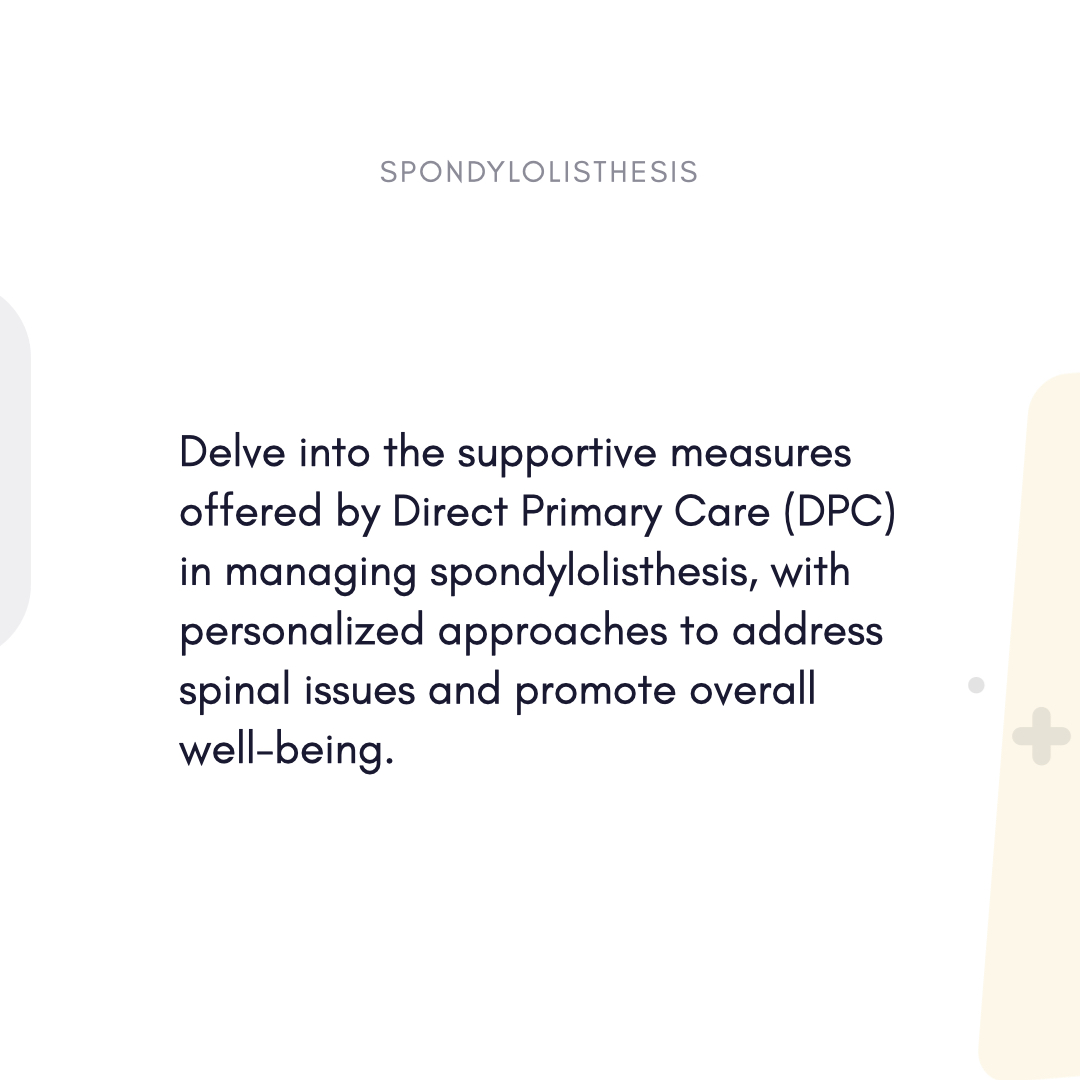Spondylolisthesis and Direct Primary Care (DPC): Personalized Care for a Stable Spine
You know how spondylolisthesis can interfere with daily life if you have ever felt a constant ache in your lower back that gets worse when standing or if you have had shooting leg pain while walking. Affecting up to 6% of adults, this disorder usually results in limited mobility, nerve compression, and muscular weakness. However, there is hope: Direct Primary Care (DPC) combines timely interventions, cost transparency, and care catered to your particular anatomy to provide a proactive, patient-first method of managing spondylolisthesis.

Dealing with Spondylolisthesis and Its Effects
Commonly in the lumbar spine, spondylolisthesis results from one vertebra slipping forward over the bone below it. Important varieties comprise:
- Common in athletes, a fracture in the pars interarticularis causes anythmia.
- Most often occurring in adults over 50, degenerative wear-and- tear of discs/facet joints results from aging.
- Congenital: Structural birth flaws in the spine.
The degree of the symptoms differs:
- Lower back discomfort extending to buttocks or thighs
- Stiffness, sometimes known as muscular tightness
- Legs' numbness or weakness (should nerves be compressed)
- Not able to stand or walk
Long-term hazards of unmanaged spondylolisthesis:
- Chronic nerve damage—that is, cauda equina syndrome—in particular
- Spinal instability calling for surgical correction
- Decreased mobility resulting in muscle atrophy
DPC Changes Everything Treatment of Spondylolisthesis
Under the membership model known as Direct Primary Care (DPC), patients pay a monthly fee—usually 50 USD–150 USD—for unlimited access to their main care physician. For those with spondylolisthesis, this means care concentrated on stabilizing your spine and restoring function, not waiting months for imaging, and not surprise bills.
Here's why DPC distinguishes itself:
1. Timely, Guideline-Driven diagnosis
Following American Academy of Orthopaedic Surgeons' guidelines, DPC doctors do:
- Targeted assessments: Differentiating spondylolisthesis from similar conditions (e.g., herniated discs) and spotting "step-off" abnormalities from physical exams.
- Cost-effective photography: Ordering MRIs or X-rays just to grade slippage severity—that is, Meyerding classification—only when absolutely necessary.
- Prescription bracing for low-grade slips or PT to increase core muscles helps early on.
2. Reasonably priced, open treatment
- By providing NSAIDs (such as ibuprofen) or muscle relaxants at wholesale rates, DPC clinics help to lower costs.
- Working with nearby PTs for programs involving cash-pay lumbar stabilization.
- Steer clear of needless specialist referrals for Grade I/II stable cases.
3. Constant, all-encompassing Help
- Having 24/7 access to your DPC doctor allows you to change your pain management strategy during flare-ups—that is, temporary corticosteroid tapers.
- Track improvement using telehealth check-ins or mobility notebooks.
- Deal with related problems including osteoporosis or obesity that strain the spine.
Benefits of DPC for Patients with Spondylolisthesis
Customized Treatment Plans
- Each visit, DPC doctors spend 30 to 60 minutes developing plans including:
- Customized PT routines: With an eye toward posture correction, hamstring flexibility, and core strengthening.
- Adjustments in lifestyle: weight loss programs to lower spinal load or ergonomic changes for desk users.
- Combining topical lidocaine patches with yoga or acupuncture helps with multimodal pain relief.
Saving Money
- There are no co-pays for quick visits during acute pain episodes.
- MRIs between 500 USD and 800 USD against 2,000 USD+, in conventional settings.
- Prevention of ER visits by means of aggressive symptom control.
Surgical Stewardship:
DPC doctors coordinate discounted consultations with neurosurgeons should surgery—such as spinal fusion—became necessary.
- Promote least invasive methods (such as TLIF against open fusion).
- Track healing to avoid problems including adjacent segment disease.
Personal Success Stories from Real Life
- Case 1: After avoiding surgery using her DPC doctor's PT and bracing plan, 34-year-old gymnast Sarah with isthmic spondylolisthesis returned to training six months later.
- Case 2: Using the negotiated rates of his DPC clinic, Tom, 62, saved 1,500 USD on epidural injections, so controlling degenerative Grade II slippage without opioids.
Ask questions about DPC and spondylolisthesis.
- Q: Can spondylolisthesis be healed without surgery?
- A: Grade I/II slips usually settle with bracing and PT. Consistent with AAOS recommendations, DPC emphasizes conservative treatment first.
- Q: For chronic back conditions, is DPC reasonably priced?
- A: Exactly. By skipping imaging mark-ups and specialist co-pays, members save 30–50% annually.
- Q: What should I do if I need a spine surgeon?
- A: A DPC physician usually gets self-pay discounts for consultations and speeds referrals.
DPC Is a Win for Patients With Spondylolisthesis
Key for spinal stability, continuity of treatment is emphasized by the North American Spine Society. DPC presents this through:
- Early catching of development Frequent observation helps to avoid worsening of slips.
- Encouragement of patients: instruction in correct lifting methods and modified activity.
- Clear financial policies for visits, imaging, and prescriptions.
Get Your Stability Back Using DPC
Spondylolisthesis need not keep you disabled. DPC helps you find a partner who steps by step listens, innovates, and gives your spinal health top priority.






